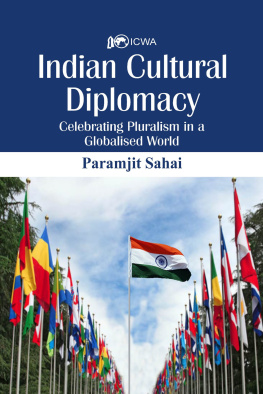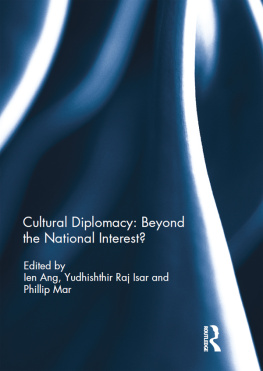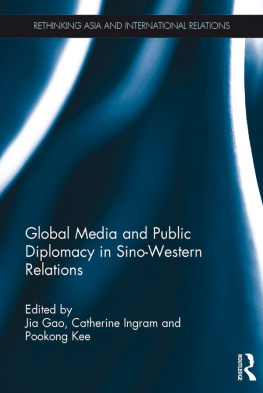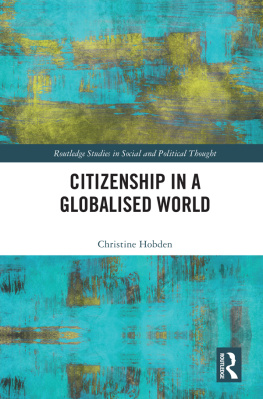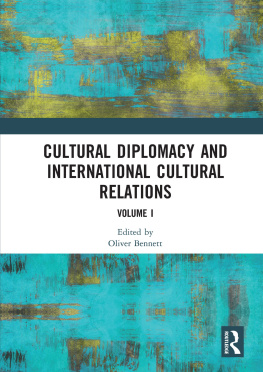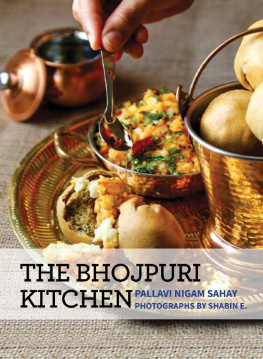Published by
Vij Books India Pvt Ltd
(Publishers, Distributors & Importers)
2/19, Ansari Road
Delhi 110 002
Phones: 91-11-43596460, 91-11-47340674
Fax: 91-11-47340674
e-mail:
web : www.vijbooks.com
Copyright 2019, Indian Council of World Affairs (ICWA)
ISBN: 978-93-88161-07-7 (Hardback)
ISBN: 978-93-88161-09-1 (ebook)
All rights reserved.
No part of this book may be reproduced, stored in a retrieval system, transmitted or
utilized in any form or by any means, electronic, mechanical, photocopying, recording
or otherwise, without the prior permission of the copyright owner. Application for such
permission should be addressed to the publisher.
The views expressed in this book are of the author/contributors in their personal capacity
and do not represent the views of the ICWA.
I am happy that my friend Paramjit Sahai has written a book titled, Indian Cultural Diplomacy: Celebrating Pluralism in a Globalised World where the author expounds both the history of cultural diplomacy of India and also highlights the importance of cultural diplomacy in the wider context of emerging power equations in the world. The author provides a fascinating tour of ideas and institutions in the realm of cultural diplomacy within India and outside in this book that he came across within India and abroad during his distinguished diplomatic career of 37 years.
Paramjit Sahai approvingly quotes the definition of cultural diplomacy provided by the Institute for Culture Diplomacy, Washington D.C. It says that; Cultural Diplomacy may best be described as a course of actions, which are based on and utilize the exchange of ideas, values, traditions and other aspects of culture or identity, whether to strengthen relationships, enhance socio-cultural cooperation, promote national interests and beyond; Cultural diplomacy can be practiced by either the public sector, private sector or civil society (ICD). The author then goes on to ask relevant questions: How central is cultural diplomacy in the diplomatic arena? Where does it find its place in the diplomatic architecture? How does it manifest itself as an important instrument in furthering foreign policy, commercial and other interests? Is there an intrinsic link between culture and commerce? Does culture precede commerce or it is the other way around? Discussing about cultural diplomacy in the Indian context in particular the author asks: What is the policy framework and structures created to pursue the policy objectives? In what manner they interplay and coordinate their roles, both at the policy and implementation levels? What role is played by cultural agreements and the cultural exchange programmes (CEPs) created there under?
In 1998, I had opined that the role of culture has increased in global affairs in the modern world. I had then written: in the last decade of the 20thcentury culture emerged as a third factor in determining the status of a nation in the world after market and military strength, the market having replaced military strength from its position of supremacy in the post-Cold War World.
As expressed through language and art, philosophy and religion, education and science, films and newspapers, radio and television, social habits and customs, political institutions and economic organizations, culture heightens the skills of an individual and a society in its totality in all walks of life because it is by culture that a man or a society gets an insight into the whole. Culture includes not only art, music, dance, and drama, but a whole way of life. In fact, culture is sanskriti, or a process of refinement. It is in this broader sense that culture has to be viewed.
We often use civilization and culture in an interchangeable manner. But there is a vital difference between the two. Civilization is much bigger and may contain in its fold several cultural expressions and values. Culture and civilization have, however, a close relationship. Civilizations are actually large cultural spheres containing many nations. In short, civilization in which someone lives is that persons broadest cultural identity. Like all human creations, civilizations also experience cycles of birth, life, decline and death but the basic tenets of culture are somewhat indestructible.
India, Egypt, Iraq, Greece, and China have been recognized as the five cradles of human civilization. By the year AD 1, India was a highly developed culture. Indias culture which blossomed more than 5000 years ago, has given successive generations of Indians a mind-set, a value system, and a way of life, which has been retained with remarkable continuity despite the passage of time, repeated foreign invasions, and the enormous growth in population. It gives to Indians as well as to people of Indian origin a unique personality today, as it has done in the past. In fact, these constitute enduring imprints on Indian consciousness.
Over the ages, there has gradually developed a composite Indian culture with its own unbroken history. The story of Indian culture is a story of unity and synthesis, of reconciliation and development, of harmony and assimilation, of fusion of old traditions with new values. One example of assimilation could be that of the ants that carry particles of foodstuff from different places and deposit them all at one place, yet each particle is distinct and identifiable. The process of assimilation in Indian culture, however, is different and is more comparable to bee activity rather than to ant activity. Bees move from one flower to the next, collect nectar, and then assimilate it so that it ultimately becomes honey. The essential feature of honey is that, while the nectar of each flower cannot be separated, the honey from each place will have its own distinctive taste depending on the season, the climate, and the flowers visited by the bees. Similarly, Indian culture is the honey prepared from the nectar of cultural activities from various parts of the country.
One of the striking features of Indian culture over the millennia has been that peace and empathy have always been a part of public discourse. For example, the most frequently quoted is the concept of the world as one family VasudhaivaKutumbakam is a floating verse, often quoted to express the harmony of human relations and associated with the Vedic world view. My enquiries revealed that this particular verse does not flow from the Vedas and the Upanishads and its authorship is not known. This verse is also found mentioned in the Hitopadesah along with other floating verses.
In several significant ways cultural diplomacy emanated from India. The phenomenon acquired prominence since the reign of Asoka (304 B.C. -232 BCE). Asoka adopted dhamma as an instrument of state policy and renounced warfare. He approached the question of effecting harmony among people and coordinating relations with neighbouring countries and beyond, in accordance with dhamma. Purely from the angle of governance, Asokas genius lies in making dhamma amenable to implementation in day-to-day life. Towards this an elaborate administrative machinery was created. Asoka introduced the officer of dhamma known as the dhammamahamattas. They were also posted in other countries.


